By Matt Resteghini on Mon, Nov 16, 2020
Mental and behavioral health clinic administrators often feel pulled in multiple directions at once. Not only are they focused on ensuring patients receive exceptional care, they need to balance that with the business of managing a practice. One way to make both goals easier is using data to guide patient and practice management.
The future of mental healthcare is measurement-based. Data-driven outcomes will become more prevalent in the mental health and substance abuse space. Pressure is increasing to show verifiable, clear and data-informed results illustrating treatment success. Forward-thinking clinics are looking for ways to collect and use data to drive mental health improvements.
Total Brain’s tools make adopting measurement-based practices easy. For starters, Total Brain’s patient-completed mental health assessment lets clinicians screen for common mental health conditions and measure patients’ needs and progress.
The Total Brain clinician dashboard makes it easy for clinicians and administrators to gather and use insights from patient assessments. Finally, Total Brain provides tailored tools and exercises patients can use for self-care wherever and whenever they need it.
Total Brain’s Assessment
The Total Brain assessment is a foundational part of the platform. When using Total Brain, administrators or clinicians can set up their patients in the platform and send invitations automatically to complete the Total Brain assessment. Assessments should be repeated regularly to capture updated information on patients’ mental health.
Total Brain scientifically measures, monitors and benchmarks markers for both mental health and mental illness. The clinically-validated assessment evaluates each patient in four performance areas and 12 brain capacities. It also screens for the top-seven most-common mental health conditions.
The assessment uses questions from the following standardized tests to clinically assess patients:
- Stress: DASS
- Depression: PHQ2/9
- Anxiety: GAD 2/7
- ADHD: Internal ADHD test
- Addiction: CAGE-AID
- PTSD: VA PTSD Test
- Social Phobia: DSM-IV
- Sleep Apnea: 1995 Maslin Sleep
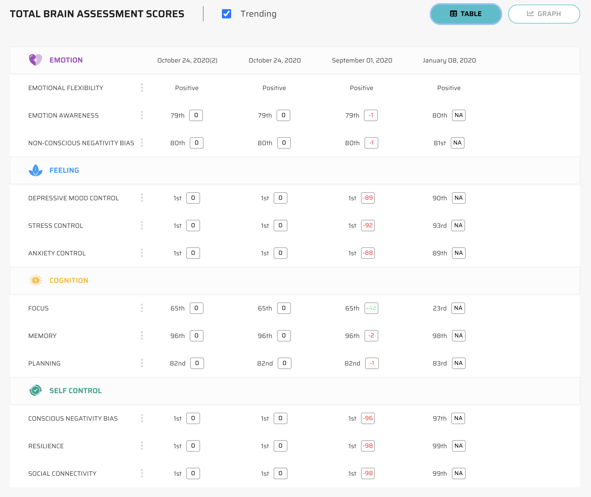
Assessments may be reimbursable as brief emotional screenings under code 96127 . That means clinics may be able to capture more revenue as they routinely screen patients across their population.
The Clinician’s Dashboard
The clinician’s dashboard within Total Brain is where clinic administrators and clinicians can track and manage patients and their care. The platform is HIPAA- and GDPR-compliant, and strict security protections ensure patient data is only visible to a patient and his or her provider. The Total Brain dashboard shows providers:
- Which patients are up-to-date on monthly assessments – This lets clinics follow-up and prompt patients to complete assessments they have not taken, or remind them to finish incomplete assessments. Clinicians or administrators can download a .CSV file from the dashboard for uploading to their EHR or use in getting insurance reimbursements.
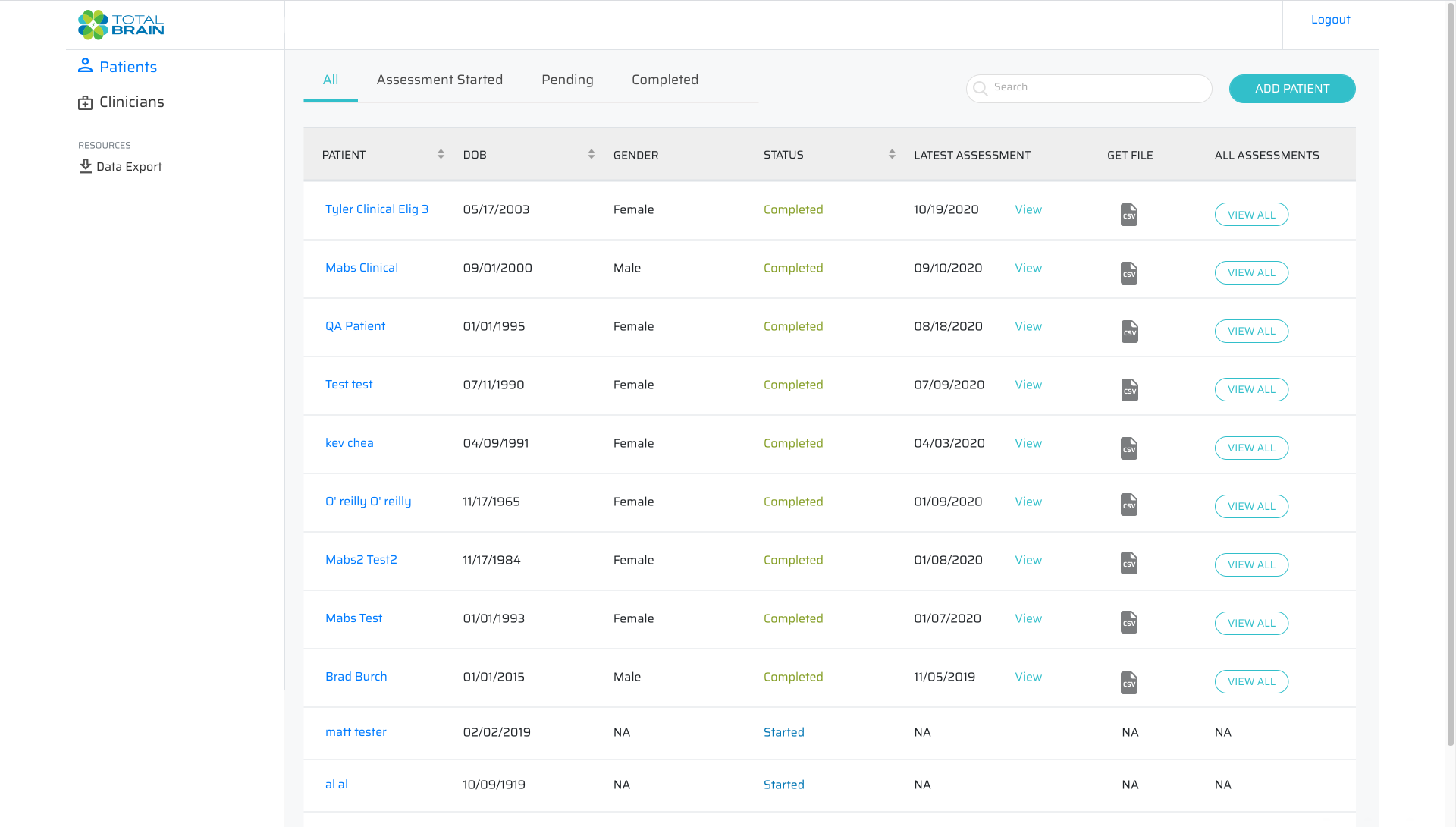
- Each patient’s current mental health status – Assessments give clinicians a point-in-time snapshot of each patient’s mental health to help plan appropriate care. The dashboard shows whether a patient has a low-, medium- or high-risk of different mental health conditions.
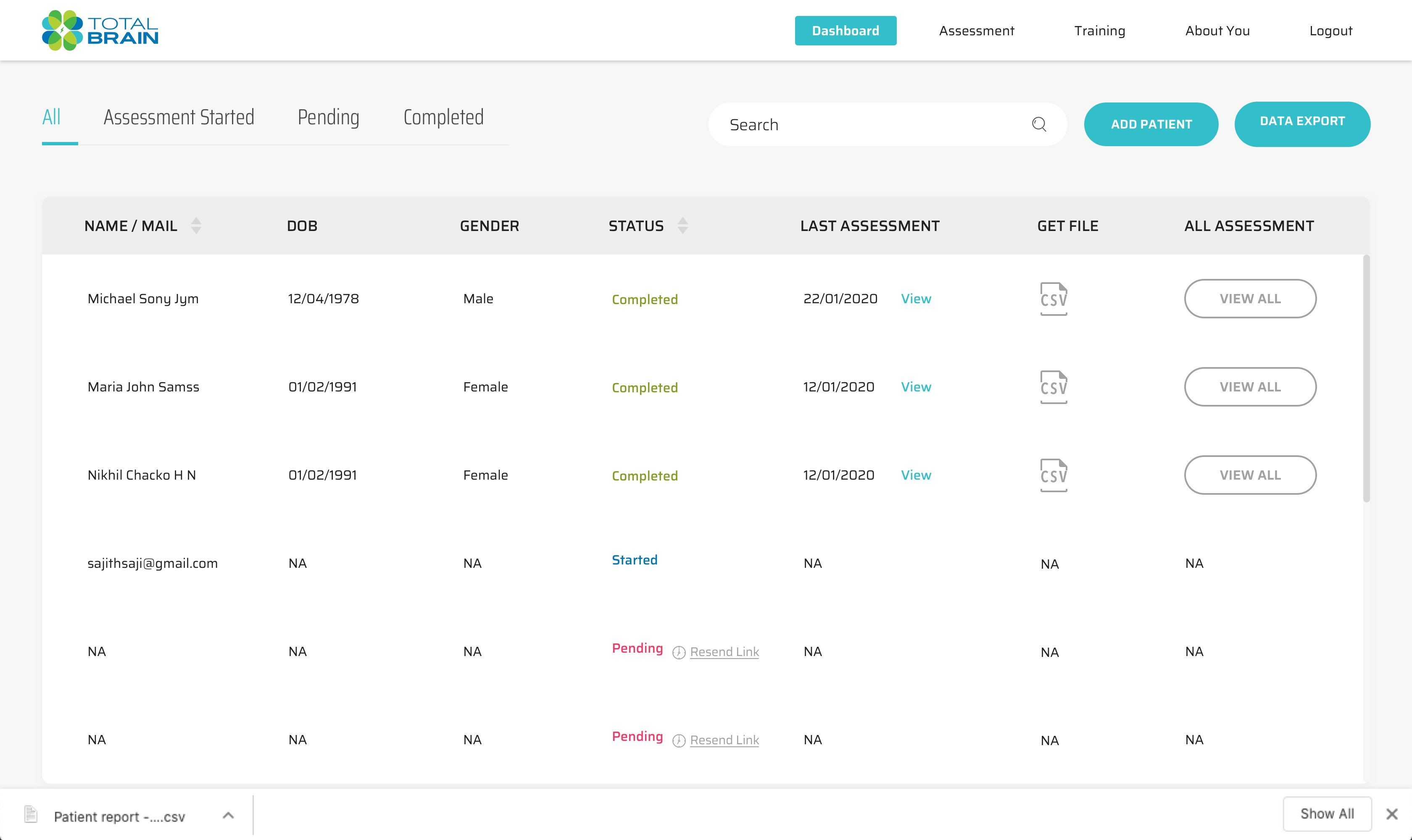
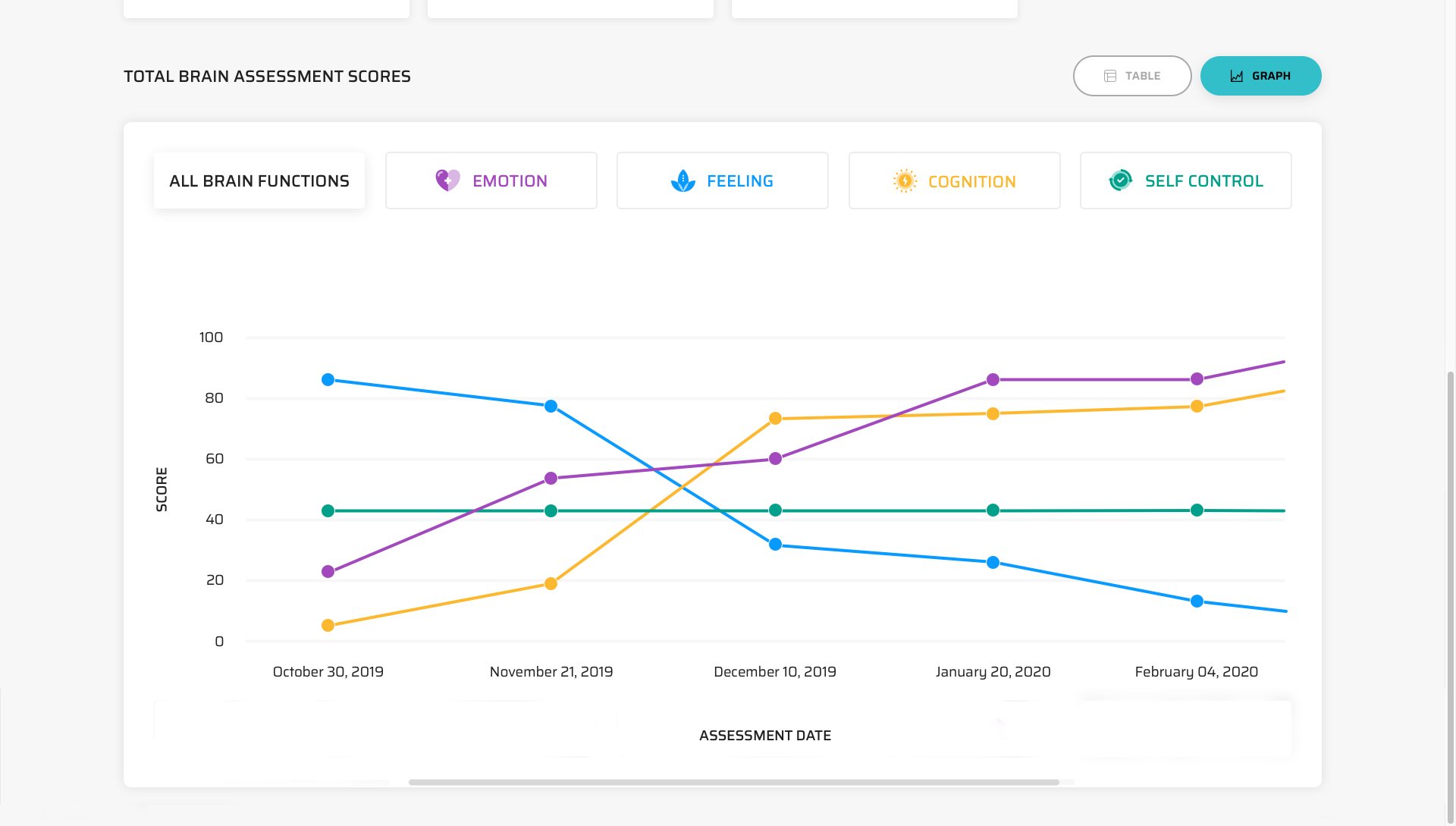
- Health trends of individual patients – By comparing month-over-month assessment results, clinicians have a clearer picture of each patient’s progress.
The clinician’s dashboard and its insights allow clinics to become more measurement-driven in their approach to both practice and care management. This helps justify treatment plans and can lead to better, evidence-based patient outcomes.
Access to Self-Care Support for Patients
Beyond Total Brain’s assessments and the clinician dashboard, Total Brain has a library of practical self-care tools for patient use. Giving patients access to Total Brain is one way to support them between therapy sessions — and Total Brain is free for patients.
Once patients have completed a Total Brain assessment, they can utilize the platform’s self-care exercises on their own. Here are three examples of Total Brain activities patients can do at home:
Practice Deep Breathing
Total Brain offers several guided breathing exercises to help patients reduce stress. Resonant Breathing is one example. When using Resonant Breathing, patients follow a digital breathing pacer that leads them to breathe at a pace of six breaths per minute for three minutes. This type of controlled, slow and deep breathing helps regulate blood pressure and also calms patients, who can feel an impact after just a few minutes. This makes Resonant Breathing a simple and effective exercise patients can practice in the moment to reduce stress, or include in a self-care routine to benefit their mental health.
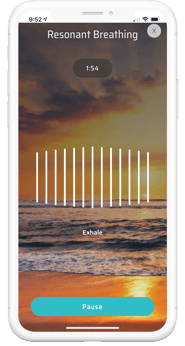
Challenge and Reframe Negative Thoughts
Total Brain’s Thought Tamer guides patients through reframing negative thoughts using cognitive behavioral therapy principles. Patients can use Thought Tamer to change how they think about a situation so they can view it in a less negative and more useful way. The tool helps patients find alternatives to common thinking traps such as catastrophizing, black-and-white thinking, “should have, could have” regrets, jumping to conclusions and overgeneralizing. It works by leading patients through three steps central to cognitive behavior therapy:
- Naming thoughts – Pausing to name the negative thought trap
- Re-appraising thoughts – Considering if there is a different, more accurate and helpful way to think about a situation
- Reframing thoughts – Intentionally assigning new and improved thoughts to a situation
Thought Tamer is explained in more detail in this blog post: Thought Tamer: A Tool for Reframing Negative Thoughts Using CBT Techniques.
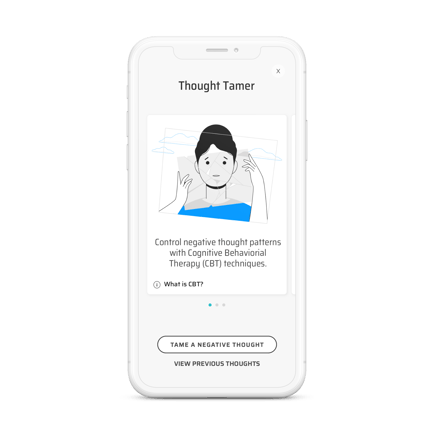
Find Calmness Through Music
The Total Brain platform includes NeuroTunes — a collection of scientifically composed music and soundscapes to reduce anxiety. Patients can choose their favorite NeuroTunes tracks and listen to stimulate their brain and induce calm. How does NeuroTunes work? The tempo, binaural beats, and isochronic tones built into its tracks alter brainwaves and drive a desired calm mood state. Because using NeuroTunes involves simply listening to music, it is a versatile tool patients can include easily in self-care routines. For more information on the science behind NeuroTunes and how Total Brain used science to create the tracks, see this blog post: Change Your Mindset With Music.
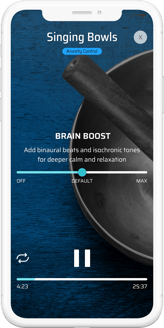
Patients with Total Brain access can take advantage of a variety of tools and exercises in addition to My Calm Beat, Thought Tamer and NeuroTunes. Some are intended for use in the moment when a patient needs help restoring calm, or reducing cravings for addiction patients. Others are to be used as part of routine self-care. By making Total Brain available to patients, clinicians can ensure patients may use its resources when they need them.
Total Brain can even recommend self-care exercises to patients based on their unique needs. The platform uses an algorithm to determine which exercises to suggest for patients. For example, as this chart shows, Total Brain will likely recommend resonant breathing and digital cognitive behavioral therapy exercises to a patient with an anxiety disorder - boosting their brain’s innate anxiety control, stress control and negativity bias capacities. In the case of addiction, because addiction patients often suffer from comorbid conditions like anxiety or depression, these tools can be used to improve some of the underlying conditions and help induce behavior change.
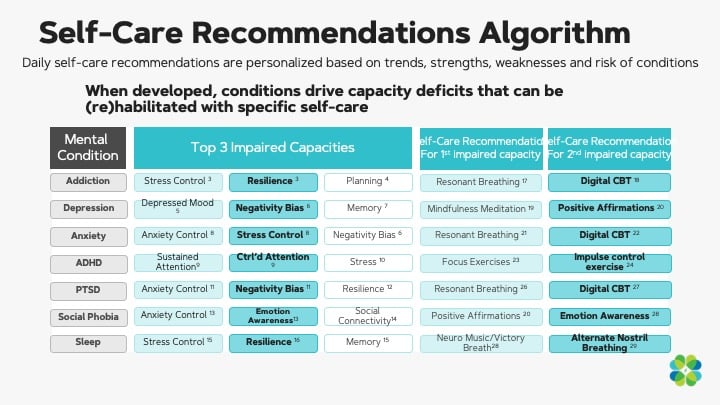
The ability to screen easily for mental health conditions, check patients’ progress and prove treatment efficacy benefits both practices and clinicians. Being able to access easy-to-use and effective self-care tools anytime benefits patients. This combo makes Total Brain a smart choice for mental health practitioners and clinics — and it is why more than 1,000 clinicians in both the addiction and behavioral health spaces have deployed Total Brain to practice more measurement-driven mental healthcare.




comments